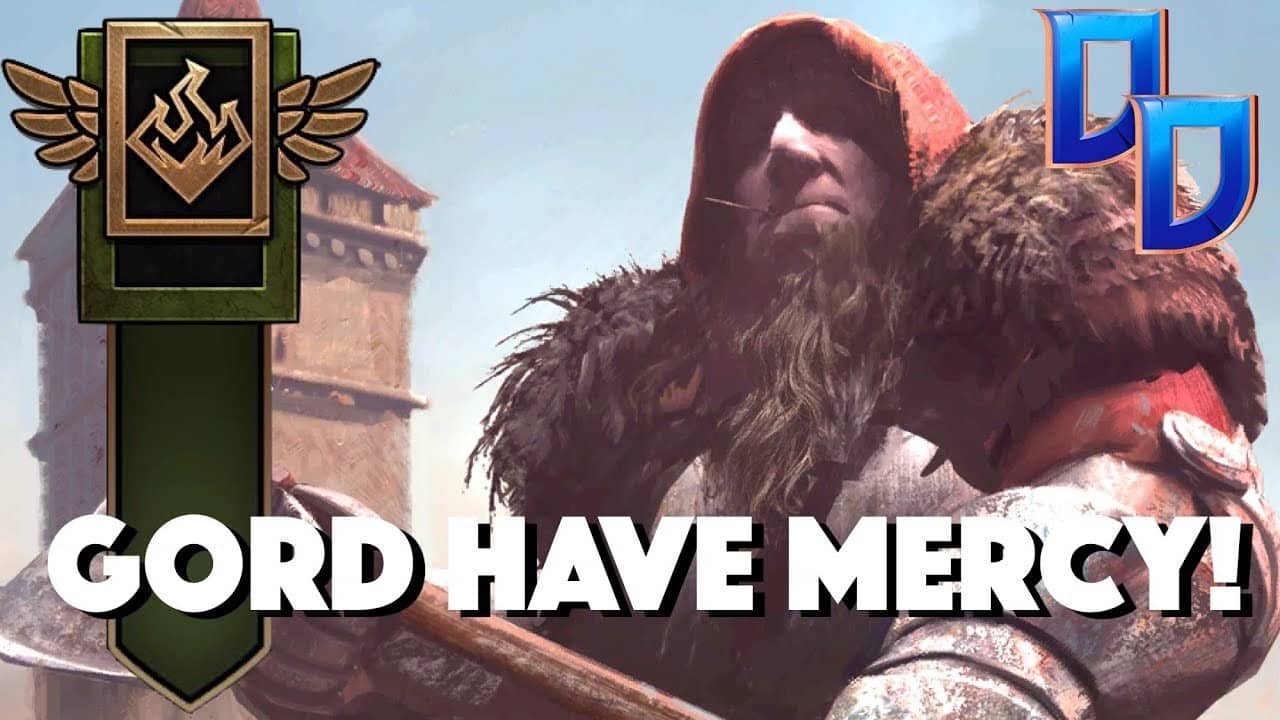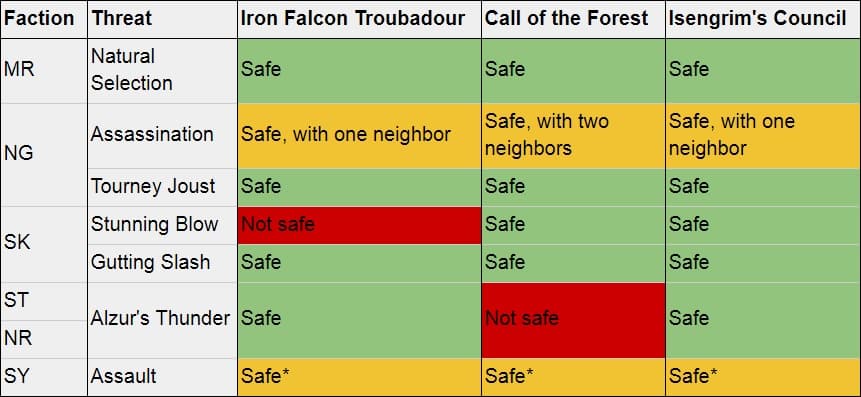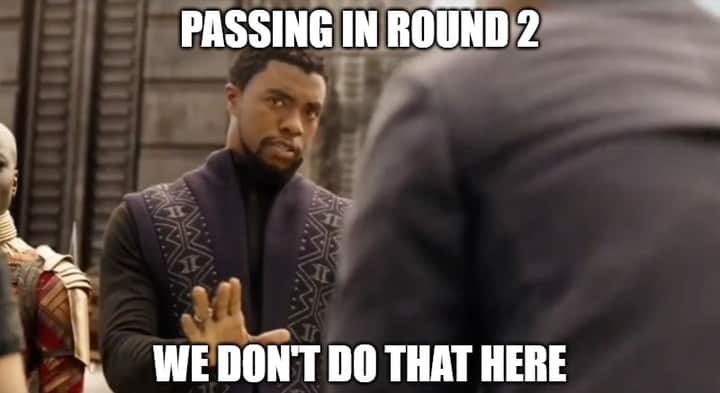Knock, knock. Who's there? It's Harald Gord and he's here to take your game to the next level. TLG's Gorflow and Wusubi have teamed up to deliver you a deck guide for one of the most satisfying lists that can currently be found on the ladder. The idea behind this Mystic Echo build is utilizing good special cards to set up a big Gord finisher.
Strengths:
- Threatening medium and short rounds, excels at bullying the opponent in Round 2
- Consistent, with a variety of ways to utilize your cards
Weaknesses:
- A relatively low amount of proactive plays can make for awkward situations
- This deck requires you to have access to your high provision cards and even with the added thinning tools, you can miss out on a key card which might cost you the game
Considerations:
- Thunder → Moon Dust or Waylay
While Thunder is universally good for removing most engines, Moon Dust can certainly find its use if you face too much Nilfgaard. It helps you deal with the pesky Hefty Helge. Waylay provides more value and still offers removal, which is useful in Scoia'tael mirrors.
Card breakdown
Feel free to skip this part of the guide if you're a more advanced player, who is familiar with the ins and outs of Scoia'tael. This is a combo-oriented deck with some nuance to it, so we feel like it's crucial to go over the most important synergies, especially for the newer players. Click on the spoiler below to see the explanation behind each card.

The Great Oak - Ever since the release of Crimson Curse, this card has been an absolute powerhouse for Scoia'tael. While most ST decks use Oak as their finisher, Gord is different. You can make the best use of Oak when pushing the opponent in Round 2. It can kill most engines, especially when combined with Berserker pings.
Oak synergizes with the swarmy nature of some of your cards like Figgis Merluzzo, Zoltan's Company and Justice. Other than that, it's fine to commit this card in Round 1 if it grants you the round control and maybe allows you to preserve your other resources such as Munro and Avallac'h.
Novigradian Justice - The bread and butter of this deck. Used primarily to pull Dwarf Berserker and delete your opponent's side of the board. In short rounds and/or against armor-heavy decks (Dracoturtle, Ramon Tyrconnel) Mahakam Marauder is an option.
If you haven't found Justice by Round 2, feel free to use your leader ability for extra thinning with Call of the Forest or Council to increase the odds of drawing Justice in a shorter Round 3, where it still packs a lot of punch.
Munro Bruys - Very threatening card and an excellent tool in Rounds 1 and 2 alike. Combined with Figgis Merluzzo or Zoltan's Company, Munro will apply a plenty of pressure on the opponent, forcing them to either commit serious resources or give up Round 1.
Call of the Forest - Primarily used to pull Oak and Munro, Call can always fetch a boosted Figgis or Sage. In a pinch, you can use it to tutor Gord. This card falls off in relevance if you drew all of your gold cards like an absolute maniac, resulting in having to use it to grab one of the Makaham Marauders.
Avallac'h - Not only is he a powerful Elf that can be tutored by Isengrim's Council, he also spawns weather which is a special card synergizing with your Sages and Gord. Biting Frost is often the best option for this deck, as combined with Berserker pings you can easily knock out the opponent's engines. With that said, sometimes you don't want to kill units because of Surrender, so Impenetrable Fog can be a viable option.
Figgis Merluzzo - Not much to say here, amazing Defender who spawns 2 Rowdy Dwarfs. Protects your Sages while enabling Munro Bruys and The Great Oak. If you use Call of the Forest on Figgis, some factions like Northern Realms can have trouble killing him.
Isengrim's Council - This card truly makes the list shine, since it's built in a way where you have guaranteed targets. Fauve is the only Dryad and Avallac'h + 2x Sage are the only Elves. You can easily manipulate your hand and deck in a way where Council can tutor 6 power Sages, or simply Fauve for some impressive chains.
Surrender - Doing the heavy lifting in Scoia'tael mirrors and against Azar Javed + Dire Mutated Hound shenanigans, this card gets better as people are starting to play armor cards from Iron Judgment.
Surrender finds some value in most matchups due to the popularity of Portal and leaders that play 2 cards in 1 turn. With that said, you still have anti-synergy with Avallac'h and Novigradian Justice. Keep that in mind and always try to spread your packages over two rounds.
Fauve - The only Dryad in the deck and thus a guaranteed Council pull. She can also pull Council herself, along with the rest of your Nature cards in Call of the Forest, Zoltan's Company, Dryad's Caress for Purify and finally Tempering. She greatly improves your consistency and the amount of pressure you can apply in Rounds 1 and 2.
Harald Gord - The best card in the game, period. Get the last say in a short Round 3 and this guy can make Ozzrel look like a bloody amateur.
Zoltan's Company - Nature card for Fauve, synergizing with The Great Oak and Munro Bruys. Also empowers your Sages and Gord in the process. Sometimes a necessary proactive option.
Morana Runestone - Running multiple 5 provision removal specials can be scary because of proactivity, which is where Runestone comes in handy. It can spawn another special card, or something ridiculous like Crushing Trap.
Alzur's Thunder, Moon Dust or Waylay - Your removal options based on the meta you're currently facing. They all have some use, so you have to adjust the deck in a smart way, depending on what's popular on your rank.
Piercing Missile - The only removal card you should never take out of this deck. Thunder can't deal with Percival, Glynnis or Armored Drakkar, which is where piercing through their armor comes in handy.
2x Sage - Best used to secure Round 1. Can be protected by Troubadour, Figgis or simply tutored out of the deck at 5/6 strength with your spells. Sage rewards you for playing special cards, which is great.
Spores - Mostly for tall boosted units like Ozzrel, Svalblod Priest or... the enemy Gord! This is your mulligan fodder in matchups without any green numbers. On Red coin, Spores can find value against Tactical Advantage.
Dryad's Caress - Can be pulled with Fauve, or if she's on the board, you get the Vitality. Having an option to Purify negative effects is overall solid in the current meta, so there's no reason to ever cut this card.
2x Tempering - Now this special card is not to be trifled with. In a spell-oriented deck that can benefit from the armor thanks to Berserkers, it plays as a more of a 5-6 provision card. With one Sage and Berserker on the board, Tempering is just scary.
2x Mahakam Marauder and 2x Dwarf Berserker - Your mulligan fodder and Novigradian Justice targets. It's okay to keep one Marauder in hand if necessary, but always try to mulligan both Berserkers.
Iron Falcon Troubadour - Other than providing the wholesome morale boost with his comfy jams, he can actually be quite useful when you give 2 armor to a card like Sage or Figgis.
If you're extremely cheeky, you can keep a bricked Berserker on purpose, give it 2 extra armor, then mulligan it and pull it with Justice. This play is very rare so if you manage to pull it off, make sure to send us the glorious clip!
How to mulligan
This deck wants to play as many special cards as possible to help Gord grow big and strong. The initial mulligan priority is Dwarf Berserker, followed by Mahakam Marauder. After that, you'll need to make a decision about how you would like to play your Sages in a given matchup and make your remaining mulligans based off of that. Be aware that you will have to maintain a Nature card in the deck for Fauve and one or two Bronze Dwarves for Novigradian Justice.
Sage can be mulliganed especially when you have Avallac'h in hand. Isengrim's Council is then guaranteed to pull Sage at 6 power, outside of removal range. You can also keep Troubadour and one Sage in hand, since the 2 armor effectively protects the Sage. It's rarely correct to mulligan Tempering since it's a threatening card when combined with Berserker. Feel free to mulligan Spores if you know it isn't going to find any value in the specific round.
Round 1: Bring out the Sages!
In the first round, your Sages will be doing the bulk of the heavy lifting. Providing an extra 2 points for every spell you play, these little beauties will allow you to quickly skyrocket ahead of your opponent. The trick, however, is getting them to stick on the board. There are some removal tools that can easily shut down the vulnerable 4 strength Sage.
Assassination, Tourney Joust, Alzur's Thunder, Stunning Blow and Natural Selection all pose a threat. Luckily, this deck is equipped with multiple tools to help your Sages survive past the turn that they're played. Still working on your matchup knowledge? Don't worry, we've got you covered. Here are your options for protecting Sages against the common threats.
*Sages brought out in this way are safe against Assault as long as the opponent doesn't have 2 or more Salamandra units on the board. If they open with Azar Javed, you better pray they didn't draw Assault.
Isengrim's Council is guaranteed to pull Fauve and your only three Elves are Avallac'h and two Sages. It also grants the tutored card a 2-point boost. That boost is paramount for Sages, as it will bring them from easy-to-remove 4 strength to a hefty you-can't-mess-with-me 6 strength.
Similarly, Call of the Forest can be used to directly tutor a Sage with a 1-point boost. Not much, but enough to get the job done in certain matchups. Keep in mind that you would much rather use Call for your crucial gold cards. Finally, this deck includes a single copy of Iron Falcon Troubadour. If you have a Sage in hand, you can play this little fella to armor him up. With that said, be wary of Stunning Blow if you are considering this option.
Once the Sages are down, play your specials and do your best to win Round 1 without going down more than one card. Winning Round 1 is very important for this deck for two reasons. First of all, it grants you the last say. Having the last say protects the invaluable Harald Gord against any kind of tall punishment your opponent might be saving.
Most importantly, winning the first round gives you control over the game, meaning that you can actually do something in Round 2 instead of getting dry passed and losing to some completely random stuff in a long Round 3.
Round 2: Cirque du Berserk
So ideally you have won Round 1 and now you're facing down your opponent in Round 2 with full control over the game. For many other decks, it may be safe to dry pass here and take the opponent into a long Round 3. Gord doesn't do that. Why, you may ask? To put it simply: you don't have to. Pushing in Round 2 does put you at risk of losing card advantage, but done correctly, it can put your opponent into an awkward position, forcing them to make difficult decisions.
This deck doesn't get much extra value from a longer round (6+ cards) like some other decks. In that sense, it is weaker in longer rounds, but much more flexible overall. The goal of the Round 2 push isn't necessarily to 2-0 the opponent, but to force them to play suboptimally.
For instance, Mystic Echo Harmony opponents are forced to play Water of Brokilon, a card they prefer to play twice in a long round. Similarly, Mystic Echo Dwarves will be forced to play their Novigradian Justice. Blood Scent opponents must consider committing leader charges and vital resources like Portal into Garkains and Orianna.
Hopefully, you're convinced that the Round 2 push is worth it, so let's get going. Now it's time to BERSERK the opponent! Despite being little, Dwarf Berserkers do a respectable amount of damage and in some situations you may find yourself playing 6 of them. They're great for pushing Round 2, because you're the one who's in control. That means the opponent cannot limit Berserker value by passing. Berserkers are your primary target for Novigradian Justice in this deck, making Justice an overpowered 14-point-play with potential removal value.
Additionally, this deck can set up for Munro Bruys to spawn two more Berserkers in two different ways: Zoltan's Company and Figgis Merluzzo. User your best discretion to determine which of these resources you'd like to commit in Round 1 and in Round 2. Keep in mind that while you might find yourself going a card down at the beginning of the Round 2 push, it's crucial to just have faith and push onward with optimal sequencing. The nature of the Round 2 push is that the opponent must at times play suboptimally or risk giving you a very good opportunity to pass.
Once you feel that your opponent has committed their vital resources, try to find a pass in which you will enter Round 3 on even cards. If they don't respect your Round 2 push and you suspect that they're holding onto their win conditions for Round 3 instead of playing them, it may be prudent to keep your foot on the gas and potentially look for a 2-0.
Round 3: His name is Gord
One way or another, you've entered Round 3. In the ideal scenario, you have retained your leader ability, have the last say and Gord is sitting in your hand, waiting to cash in on the dozen specials you have played during the match. But after all, things don't always go so smoothly. Maybe you never drew Gord.
In that case, hopefully you didn't commit the leader ability during the Round 2 push, because replaying Call of the Forest is your get out of jail free card. Never drew your Call? Sounds like you need to get more SKILLED. All jokes aside, Round 3 is the easiest of the three. Play out your remaining cards to the best of your ability and slam Harald Gord as your big finisher. This way, your opponent can't react and murder him with tall punishment.
Addendum
This guide only describes what we consider to be the ideal way of playing Mystic Echo Gord. And that's winning Round 1, pushing your opponent in Round 2 and then finishing off with a short Round 3 where Gord emerges victorious. However, it's just that - a guide. There will be matchups where draws or circumstances force you to go off the rails. You may have to play your Novigradian Justice early, sometimes you don't draw it. You can miss both Sages in Round 1, or god forbid your essential golds like The Great Oak or Munro Bruys.
In some cases, you might lose Round 1 and/or find yourself in a long Round 3. Learning how to approach these situations simply takes practice, we can only suggest watching our Youtubers and Twitch streamers. It's also very important to not be discouraged by suboptimal conditions. This deck provides a lot of flexibility and options, so make use of them and put the opponent in the dumpster, where they rightfully belong.






Leave a Reply